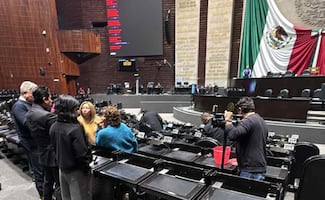Más Información

Detienen a "El Guayabas" junto a otros líderes huachicoleros en Puebla; aseguran más de 40 mil litros de combustible

Goteras interrumpen sesión en la Cámara de Diputados; ponen cubetas para proteger curules y micrófonos

Muertes violentas de mujeres serán investigadas como feminicidio; Secretaría de las Mujeres lanza estrategia nacional

"Cuba es un paciente desfalleciente"; Ricardo Pascoe examina en Con los de Casa el impacto regional de Trump
Petroleos Mexicanos, known as Pemex, is undergoing sweeping reforms after which CEO José Antonio González Anaya hopes it will emerge as one of the industry's leading national companies such as Norway's Statoil.
González Anaya, 48, took over the Pemex leadership in February as it struggled with a deep rout that took oil to a near 13-year low. He has since accelerated a reform plan he said will be achieved through asset sales and joint ventures with foreign oil companies.
Before that however, Pemex's production is expected to decline in 2017 from this year's levels of 2.13 million barrels per day, but is expected to stabilize in 2018, González Anaya told Reuters.
Speaking in London after meeting investors, he did not rule out a public offering, similar to a plan announced by Saudi Arabia, but said he did not see one in the near future.
Pemex, which cut its 2016 budget by 100 billion pesos (US$5.42 billion), this month announced its first-ever stake sale in the US$11 billion Trion field development in the Gulf of Mexico, a key element in the country's plan to open up the oil and gas sector to private capital after Pemex's monopoly was ended in 2013.
The so-called farm-out process has so far attracted strong interest from international oil companies, González Anaya said. The deep water field holds reserves of around 485 million barrels of oil and is planned to begin production in 2023.
Pemex now plans to make further farm-outs and asset sales in onshore and shallow-water fields that will allow it to increase productivity and pay off debt, which reached US$86.8 billion in the end of 2015.
"We want to stabilize the level of our debt in the future. That is one of our goals. We need to improve our efficiencies and cost structures and be more productive," González Anaya said.
The company has almost completed its program to raise 30 billion pesos, around US$1.6 billion, he said. Pemex said in a presentation to investors it was assessing market conditions for new U.S. dollar and Japanese yen debt issuance.
DIVERSIFIED MIX
Since its creation in the 1930s, Pemex helped build a large part of the country's infrastructure and economy and as a result today retains legacy stakes in hundreds of assets and businesses spanning from refineries to ports and fertilizer companies.
"Our first step is to sell non-strategic assets."
"We need a diversified mix. We need to have an onshore farm- out which can come on line in a year, and some shallow-water ones which can increase our rate of recovery for some of our existing fields.
"Pemex is sitting on 490 assets and we have every single type of asset. So if we are smart and we work hard and diversify our farm-out portfolio we could gradually have the possibility to stabilize and raise the (production) platform a bit," González Anaya said.
Pemex is currently drawing up a business plan it aims to publish in August which will outline its longer-term strategy and possibly include asset sales and production goals.
"We want people to be able to plan. Nobody has US$11 billion sitting around so they need to know what we plan to do and with what time line. It should be an investor-friendly plan."
He also said Pemex was considering launching its new oil price hedging program, which would be separate from the traditional hedging program of the Mexican government.
While the government is keen to protect its revenues, Pemex would be keen to avoid a repeat of shock spending cuts it had to perform earlier this year after oil prices plunged, he said.
Noticias según tus intereses
[Publicidad]
[Publicidad]










